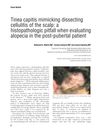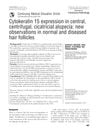Search
for
Sort by
Research
510-540 / 899 results
research Tumor Necrosis Factor-Alpha Inhibitor Associated Psoriasiform Alopecia (Drug-Induced Psoriasiform Alopecia)
Some patients on anti-TNF drugs experience a type of hair loss called TAIAPA.

research Psoriatic Alopecia/Alopecia Areata–Like Reactions Secondary to Anti–Tumor Necrosis Factor-α Therapy: A Novel Cause of Noncicatricial Alopecia
Anti-TNF therapy can cause a unique type of hair loss that may get better with topical treatments without stopping the therapy.
research Hair Follicle Biology, the Sebaceous Gland, and Scarring Alopecias
Hair follicles grow hair and release it through the skin.
research Ornithine Decarboxylase Expression Leads to Translocation and Activation of Protein Kinase CK2 In Vivo
High ornithine decarboxylase levels may lead to hair loss and cancer by increasing CK2 activity in the nucleus.

research Dissociated Human Dermal Papilla Cells Induce Hair Follicle Neogenesis in Grafted Dermal-Epidermal Composites
Human skin cells can create new hair follicles when transplanted into mice.
research Do Changes in Chromosomes Cause Aging?
Chromosomal changes, including those in the WRN gene and rDNA, may significantly contribute to aging.

research Drug-Induced Alopecia After Dupilumab Therapy
Dupilumab may cause significant hair loss, which can reverse after stopping the drug.

research Central Scalp Alopecia Photographic Scale in African American Women
A scale was made to measure hair loss severity in African American women.

research Clinical and Histopathologic Features of Hair Loss in Patients with HIV-1 Infection
People with late-stage HIV-1 often experience a specific type of hair loss linked to multiple factors, including nutritional issues and immune responses.

research Inflammatory Tinea Capitis (Kerion) Mimicking Dissecting Cellulitis
Prompt treatment of inflammatory tinea capitis (kerion) is crucial to prevent scarring and hair loss.

research Human TSC2-Null Fibroblast-Like Cells Induce Hair Follicle Neogenesis and Hamartoma Morphogenesis
Cells from a skin condition can create new hair follicles and similar growths in mice, and a specific treatment can reduce these effects.
research Curly Wood and Tiger Tails: The Tiger Tail Phenomenon in Trichothiodystrophy
Tiger tail bands in hair are caused by wavy hair fibers with melanin, unlike straight fibers in normal hair.

research Tinea Capitis Mimicking Dissecting Cellulitis of the Scalp: A Histopathologic Pitfall When Evaluating Alopecia in the Post-Pubertal Patient
A fungal infection can look like a different scalp condition in teens, leading to wrong treatment until proper tests are done.

research Hair Diseases
Most hair loss can be diagnosed with patient history and physical exam, and a few common types make up most cases.
research Assessment and Treatment Outcomes of Persistent Radiation-Induced Alopecia in Cancer Patients
Persistent radiation-induced hair loss is dose-dependent, and treatments like topical minoxidil can be effective.

research Evidence of Increased DNA Methylation of the Androgen Receptor Gene in Occipital Hair Follicles from Men with Androgenetic Alopecia
Men with hair loss have more DNA changes in back-of-head hair follicles, possibly protecting them from thinning.

research Distinctive Histopathologic Findings in Linear Morphea (En Coup De Sabre) Alopecia
The study found unique skin changes in a rare type of alopecia linked to a skin condition called linear morphea.

research A Model System to Analyze the Ability of Human Keratinocytes to Form Hair Follicles
Scientists developed a system to study human hair growth using skin cells, which could help understand hair development and improve skin substitutes for medical use.

research Cytokeratin 15 Expression in Central, Centrifugal, Cicatricial Alopecia: New Observations in Normal and Diseased Hair Follicles
CK15 is not a reliable marker for stem cells in damaged hair follicles from patients with CCCA.

research Histopathologic Diagnosis of Multifactorial Alopecia
Some people's hair loss is caused by multiple factors, with the most common being a mix of AGA and CCCA.

research Vulvar Problems in Elderly Women
Older women often have vulva issues due to less estrogen, which can be misdiagnosed and lead to wrong treatments.
research The Temptation of Large Numbers: Pitfalls in Epidemiological Research
Large databases in research can lead to misleading conclusions due to biases and chance findings; researchers should analyze data more rigorously.

research Differentiating Central Centrifugal Cicatricial Alopecia And Androgenetic Alopecia In African American Men: Report Of Three Cases
The document concludes that central centrifugal cicatricial alopecia (CCCA) should be considered in African American men with vertex hair loss and scalp symptoms, and that prompt diagnosis and treatment can slow disease progression.
research Actos, Slings, Finasteride, and the Vaccine Compensation Solution

research Hair Transplantation in the United States: A Population-Based Survey of Female and Male Pattern Baldness
Americans see hair transplants as valuable for treating hair loss and want them to be more affordable and tailored to each gender.
research Granulomatous Alopecia Areata Is a Valid but Rare Histologic Subset of a Common Disease
Granulomatous alopecia areata is a rare but real form of hair loss.
research Persistent Radiation-Induced Alopecia in Patients with Central Nervous System Tumors and Head and Neck Sarcomas
Radiation therapy with chemotherapy can cause severe, long-lasting hair loss.
research Rejuvenation

research Radioprotection of Lung Tissue by Soy Isoflavones
Soy isoflavones can protect lung tissue from radiation damage.